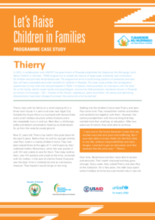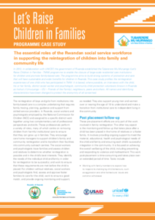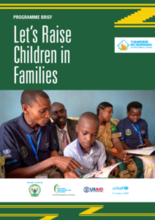Demographic Data
|
Sources: World Bank, UNDP, UNAIDS, DHS 2013 |
Displaying 5831 - 5840 of 14395
This qualitative research asked case managers in the Western Australia's child protection system what contributed to timely reunification of children with their families, a recent policy goal.
The aim of the present quantitative study is to examine how perceived maternal acceptance-rejection contributes to the risk of mental illness in orphaned adolescents.
The purpose of the review, developed by International Child Development Initiatives, was to present an overview of (as much as possible) evidence-based promising practices in Family Strengthening interventions in Cambodia, implemented by FCF|REACT partners.
This qualitative study uses speech act categories and stages of concern to examine the voices of concern, of teachers and caregivers towards the academic performance of foster children in Malaysia.
This case study profiles the reintegration experiences of one child who has participated in the Tubarerere Mu Muryango (Let’s Raise Children in Families - TMM) programme in Rwanda.
This case study profiles the reintegration experiences of one child who has participated in the Tubarerere Mu Muryango (Let’s Raise Children in Families - TMM) programme in Rwanda.
This case study profiles the reintegration experiences of one child who has participated in the Tubarerere Mu Muryango (Let’s Raise Children in Families - TMM) programme in Rwanda.
This case study profiles the reintegration experiences of one child who has participated in the Tubarerere Mu Muryango (Let’s Raise Children in Families - TMM) programme in Rwanda.
This programme brief is part of a package of materials documenting successes and lessons learnt from implementation of the Tubarerere Mu Muryango (TMM) child care reform programme between 2012 and 2018.









